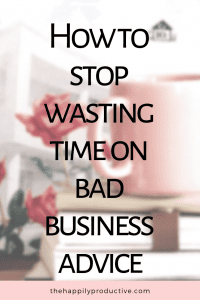You might hate me after reading this post about business advice. Or you might feel like I’m speaking right from your heart. In any case, there is way too much business advice on the internet, and that is exactly why I need to add my own into the mix. Doesn’t sound logical? Just keep reading. 🙂
Nowadays, we probably all research everything on the internet. I do, for sure. How to get rid of a headache, how to master SEO on my website, how to cure my cat’s diarrhoea…
The tricky area of business advice
I guess we all know that not everything we read is true. A lot of what’s out there is plain contradictory, too. Usually, I don’t have a problem telling apart valuable information from all the other noise. But there is one topic for which my intuition didn’t work: how to find good, reliable business advice.
If you’ve ever decided to create a project of your own, such as a blog, you probably know how overwhelming it is. No matter how many helpful checklists you’ve accumulated, you still don’t really know how to go about your market research or how exactly you build a website.
For me, these questions resulted in hours and hours of research on Google. WordPress, SEO, prospecting, finding clients, pricing… I needed information on everything. And there’s so much of it out there! You’re basically bound to find an answer to almost any question you have.
The problem with researching business advice online is that whenever you know nothing about a topic, you tend to be a little naïve. I was, at least.
Unreliable sources and copycats
I have a theory that a big portion of online businesses makes money by giving other people business advice. Yet they haven’t really created anything themselves yet!
Seriously, how many new bloggers do you see offering blogging advice? I’ve researched blogging so much that I should know every strategy there is under the sun. Yet in reality, all this research hasn’t gotten me very far.
As far as I can tell, some people tend to just copy and paste other people’s advice in order to make money. And people like me fall for it. I’ve done multiple free courses, a couple paid ones and read around a thousand blog posts on topics like Pinterest and traffic acquisition, and most of them have gotten me nowhere. Once I had the basics down, most (not all!) posts and courses were just repeating what I already knew.
Or take the ever ongoing debate about WordPress vs. Blogger, for example. When I started out on Blogger, everyone in my blogging communities was telling me that is was a stupid idea. I asked for the reason so many times, and all I got was “it doesn’t look professional when you don’t have a real domain name”. Nobody seemed to care that you can use a paid domain name with Blogger…
At one point, my curiosity took over. When creating this blog, I tried out WordPress, just because I wanted to know how it works. And it turns out, I like it way better than Blogger. But not for any of the reasons anyone told me! I just love that there are so many tutorials and plugins out there that you can get creative with your website.
All of this made me feel like the people who gave me advice never even looked at Blogger. They read somewhere that WordPress is better and kept repeating.
Even technical business advice can be false
I figured out the whole “blogging advice” issue a couple of months ago. It’s pretty obvious after a while, really.
But what shook me quite a lot what discovering that even more technical and apparently serious business advice I read was just plain false in my specific case.
Let me give you an example. My freelancing website is static – it doesn’t have any real content except the list and prices of services I offer. Yet I kept reading over and over again that a website needs fresh content in order to get views on Google. I was actually pretty discouraged with it, and because I had no motivation to write blog articles on translation topics, I pretty much abandoned it.
Then, I did a Google workshop (organised by Google) and I thought, oh well, why not ask them if there is any way to actually make my static website work?
So I sat down with a Google employee and we started looking and my website, my stats, etc. Do you know what I learnt? The reason why I didn’t get any organic traffic was not that it’s static, but because I made one of those popular one-pager websites. Turns out, those aren’t good for SEO and only work for renowned companies who drive plenty of traffic from different sources first!
The employee also told me that he had heard the myth of having to create new content all the time. He explained that it’s true for some websites (like blogs), but not for all industries. If my competitors don’t create new content, I don’t have to, either!
So there you go, even SEO advice can’t be trusted sometimes!
Conclusion
Can you tell that this topic is pretty close to my heart? Maybe it’s just me, but I’ve spent way too much time following bad business advice that just didn’t work for me, and it can be really frustrating. At first, I thought that I was just doing something wrong. But there just isn’t one magic solution that works for everyone – and so it’s better to be picky about the strategies you try and chose those that really apply to your situation.
Now don’t get me wrong, I still do tons of research online. But I’m much more careful about whose business advice I trust. I tend to read about the person who is giving advice, check out their work, and decide if their values are similar enough to mine. Doing this before jumping right into work saves me so much time!

I’d really love to know your opinion on this topic! Have you encountered the same problems with unreliable business


Couldn’t agree more with what you said about people repeating the same advice over and over again. Yesterday I bought ”Six-Figure Blogger” course, and even though I’m only 20% done, I already learned so much new information I can’t wait to apply to my blog.
As you’ve said in the end, reading about the person who is giving advice and seeing if they have had any success, is important when deciding how valuable someone’s advice actually is and should we even do as they say.
Such an interesting topic!
That’s great! I also found a really good Pinterest course last week (finally!). There are definitely good courses out there, but it can get frustrating to stumble over so many bad ones before you find them.
I do agree with your points. You have to be very choosy while selecting someone’s advice. Trust someone who is doing good at their own business.
Soe true! If someone managed to create their own business, they must have done something right. So I’m much more inclined to trust what they say.
I agree! This post is so valuable for so many people that are juggling different advice. It’s so much more than just jumping in blindly, it takes knowledge and dedication. Thanks for the article!
Jumping in blindly just doesn’t work! It’s always good to spend a bit of time finding the right advice, instead of wasting time on bad advice. I’m glad you liked the article! 🙂
This is great!
It’s so easy to get bogged down with trying to follow the “advice” to be successful, that it actually gets in the way!
I’m glad you liked it! And I totally agree.
So true!
I’ve read so many posts and take courses and they pretty much all say the same thing.
It’s ok for total newbies to blogging on just new to working online in general but later on we need more targeted advise and it hard to find.
Great post 🙂